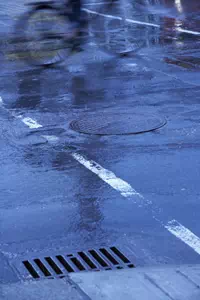Stormwater Permitting
Stormwater carries away dirt and debris, oil from parking lots, lawn chemicals, pesticides, and other pollutants. To minimize the effect of these pollutants on our waterways, under the authority of the CWA, EPA has promulgated stormwater regulations (40 CFR 122.26 -- Stormwater Discharges).
A Clean Water Act permit is required for stormwater discharges from any construction activity disturbing:
- 1 acre or more of land, or
- Less than 1 acre of land, but that is part of a common plan of development or sale that will ultimately disturb 1 or more acres of land.
Construction activity includes earth-disturbing activities such as clearing, grading, and excavating land and other construction-related activities that could generate pollutants.
In most states, stormwater permits are issued by the state environmental protection agency. Use the Construction Stormwater Locator to find relevant information for you state.
Aside from construction, if a healthcare facility meets the definition of a municipal separate storm sewer system (MS4) it must obtain a Phase II permit. The MS4 definition includes facilities such as hospitals, universities, and prisons that are in urban areas and are owned or operated by a state, city, town, borough, county, parish, district, association, or other public body and have a system of stormwater conveyances (including roads with drainage systems, municipal streets, catch basins, curbs, gutters, ditches, man-made channels, or storm drains). Healthcare facilities that fall under the definition of an MS4 must obtain a stormwater discharge permit from their state environmental agency or EPA, abide by the rules stated in the permit, and renew the permit every five years. Most hospitals are covered by statewide General Permits (e.g., South Carolina), however some states use individual permits.
If a healthcare facility must meets the definition of a municipal separate storm sewer system (MS4) it must obtain a Phase II permit. The MS4 definition includes facilities such as hospitals, universities, and prisons that are located in urban areas and are owned or operated by a state, city, town, borough, county, parish, district, association, or other public body and have a system of stormwater conveyances (including roads with drainage systems, municipal streets, catch basins, curbs, gutters, ditches, man-made channels, or storm drains). Healthcare facilities that fall under the definition of an MS4 must obtain a stormwater discharge permit from their state environmental agency or EPA, abide by the rules stated in the permit, and renew the permit every five years.




